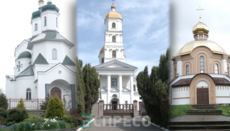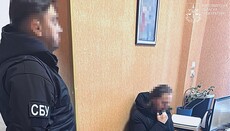Text of Cyprus Church Synod’s communiqué on Ukrainian issue published

Following an extraordinary meeting, the Holy Synod of the Cyprus Orthodox Church adopted a communique dedicated to the Ukrainian church issue.
The meeting took place on February 18, 2019 under the chairmanship of Archbishop Chrysostom of Cyprus. The text translated from the Greek language is published on the DECR site of the UOC.
We give the full text of the communiqué of the Holy Synod of the Cyprus Orthodox Church.
Communique of the meeting of the Holy Synod of the Cyprus Church on the Ukrainian ecclesiastic issue
The Holy Synod of the Church of Cyprus was convened today, on Monday, February 18, 2019, for an extraordinary meeting chaired by His Beatitude Archbishop Chrysostom of Cyprus to discuss in detail the topic of autocephaly of the Ukrainian Church, which, given it gained momentum, concerns the issue of unity [of the entire] Orthodox Church.
Being aware of the responsibility of the Cypriot Church in the face of the entire Orthodox Church, as one of the ancient autocephalous churches, which received autocephaly from the Ecumenical Council, and which holds aloof from any national hatred or interference in jurisdiction and law and pursues no benefit of its own, the Holy Synod decided to present its point of view on the positions and principles that should guide the relations between the Orthodox Churches, with the belief that adherence to these principles can help overcome the crisis.
1. Every nation has the right, with the attainment of national independence, to strive for church autocephaly. This [right] is provided by the sacred canons (“may the ecclesiastical rights concerning borders vary with state administration”).
2. If sincerity is necessary for the peaceful coexistence of ordinary believers, while insincerity undermines the relationship between them, then it is all the more so for relations between the Churches. How stable and sincere are the relations between our Churches if, despite the unanimous decisions taken at the meetings of the Primates of the Orthodox Churches in 2014 and 2016, regarding the convocation of the Holy and Great Council, the four Churches, without any substantial reason, do not take part in it ? How do we respond to the call of the Lord: “Let your word be: yes - yes, no - no” (Matt. 5:37)? Even more surprising is the appeal for consensus a posteriori from those Churches that first violate it themselves, and then urge to adhere to it. Prior to this, an exhaustive answer was given, which was accepted by all participants in the Council of the Primates in 2016. The agreement (consensus) applies to every church present at the Council, and does not contain the possibility of voluntarist obstruction in making decisions whatsoever. If one or two Churches do not agree with any decision, then their disagreement is recorded, but the decision is signed by everyone. The voice of the canons is clear: “Let the opinion of the majority prevail.”
3. What seriousness do we, the Orthodox, demonstrate to the rest of the Christian and non-Christian world, when in solving serious problems, we cannot agree on how to sign agreed-upon questions? How do we affirm with our whole life that we adhere to the Lord’s commandment “who wants to be the first among you, let him be the last” (Mark 9:35)? If the agreement on proclaiming autocephaly, which was achieved at the V Pre-Council Conference, was not canceled due to the lack of agreement on the method of signing Tomos on autocephaly, would today's problem have occurred?
4. How much we risk faith when we interrupt the Eucharistic communion between our Churches! Is it possible for some ecclesiastical decision to terminate the operation of the Holy Spirit in temples operating under the jurisdiction of another Church? The apostle Paul’s call is clear – we must prove that we are trying to “maintain the unity of the spirit in the union of peace,” and confirm that we are “one body and one spirit ... one Lord, one faith, one baptism” (see Eph. 4:3-5). The Divine Eucharist, according to which people are sanctified, must remain outside the scope of ecclesiastic disputes.
5. The cessation of the commemoration of the Primate of another Church for any administrative or jurisdictional reasons does not indicate the presence of Orthodox humility. When such temptations and scandals inflict suffering on our faithful, we, as church leadership, set a bad example for them. Unfortunately, this is not the first time. There is a case of [cessation of communion] between the Antiochian and Jerusalem Patriarchs, as well as more ancient cases between the Ecumenical and Jerusalem Patriarchates, and between the Ecumenical Patriarchate and Athens.
6. The two-thousand-year experience of the Cyprus Church and the entire Orthodox Church as a whole gives us reason to doubt the possibility of legally backdating those ordinations that were committed by banned, excommunicated and anathematized bishops. The ban, excommunication and anathema of individuals who initiated the Ukrainian crisis were recognized by all Orthodox. The right of appeal, when submitted, must have certain limitations on the timing of its filing [on these rights] and its consideration.
If we follow in good faith the stated principles and show readiness to comply with the canons of the Orthodox Church, then not only the Ukrainian problem, but also all other issues that complicate the life of the Church will be solved.
As for the specific issue of autocephaly of the Ukrainian Church, we believe that:
• The announcement of the granting of autocephaly to the Ukrainian Church by the Ecumenical Patriarchate took place with the aim of reconciliation and achieving unity of the local Church. We do not question this goal. However, today this goal is not achieved.
• It would be logical to give a certain reasonable time for the result to be seen. If the goal is not achieved, then we expect the Ecumenical Patriarch to take advantage of his coordination role, which is foreseen by his first position in the Orthodox world, either to convene a Pan-Orthodox Council or a Primate's Conference to resolve this issue. Our main concern should be the salvation of God's people living there [in Ukraine].
• However, even if unity is achieved around the new church leadership, the Ecumenical Patriarchate must again find a way to calm the consciousness of believers regarding the authenticity of ordinations and sacraments, performed by this leadership.
• Also, understanding the sensitivity of the Russian people in relation to the place where their ancestors received baptism, the Ecumenical Patriarchate should take care to ensure the appropriate jurisdiction there.
The Church of Cyprus leaves itself at the disposal of all who are interested in the reconciliation of the Church, "which the Lord secured with His own blood" (Acts 20:28).
Holy Archdiocese of Cyprus
February 18, 2019
As reported by the UOJ, according to the decisions of the Synod, which took place on February 18, the Church of Cyprus does not intend to recognize the OCU in its existing status. The reason for this is the invalidity of the priestly and episcopal ordinations in the OCU and the lack of church unity in Ukraine.
Recall, the “bishop” of the OCU, Pavel Yuristy, with the attendants who, with the blessing of Patriarch Bartholomew of Constantinople, are touring the monasteries of Holy Mount Athos, were received in several Athos monasteries – Xenophontos, Pantocrator, New Esphigmenou and Vatopedi, but were not allowed onto the territory of Holy St. Panteleimon monastery, the monasteries of Zograf and Dochiariou, while in the Simonopetra monastery they were allowed to venerate the shrines but were immediately escorted out without being let into the monastery courtyard.





